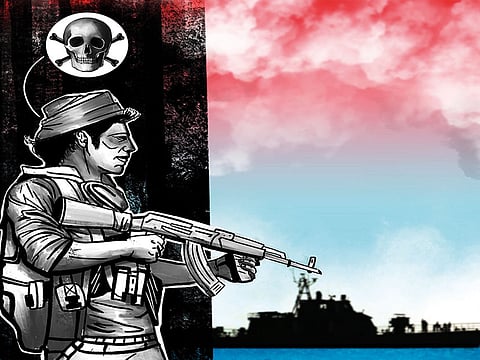Al Houthi piracy in Red Sea is unacceptable
Protection of maritime routes and corridors is a collective responsibility that must involve all nations to ensure smooth flow of energy supplies

The decision by Saudi Arabia to temporarily halt its oil shipments through the Strait of Bab Al Mandeb could be followed by other Gulf Cooperation Council (GCC) countries in future if Al Houthis continue to threaten maritime navigation and international trade in the Red Sea. The Saudi move came after the attack by Iran-backed Al Houthi militias on two Saudi oil tankers on July 25. (Earlier this month, on August 4, Saudi Arabia’s Energy Minister Khalid Al Falih announced that oil shipments had resumed.)
However, the moot point is: Will the rest of the Gulf nations retaliate in the same way in future and stop their oil shipments across Bab Al Mandeb? It is one of the most effective means to exert pressure on Al Houthis to halt their piracy in the Red Sea. The attack by Al Houthis was very much expected by the legitimate government in Yemen and the Arab Coalition countries. However, some major powers did not give attention to the Al Houthi threats and failed to anticipate such brazen attacks that pose a serious threat to a vital international artery for global oil flows.
Those who closely monitor the daily events in Yemen, will notice that Al Houthi threats against maritime navigation increased immediately after a halt in the coastal battles — an approach that was introduced by the United Nations to give a boost to peace efforts, aimed at ending the war in Yemen. Efforts were made by Martin Griffiths, Special UN Envoy to Yemen, to end the stalemate, though no breakthrough could be achieved.
On the contrary, Al Houthis were able to regroup and catch their breath during the 45-day truce period. Al Houthis never respected international legitimacy resolutions in the first place and have always acted as a rebel gang. The fact that the battle to liberate Hodeida was postponed gave them a leeway. Had the port been liberated, Al Houthis would not have been able to threaten international trade through the Bab Al Mandeb Strait in the first place.
The threat
Pertinently, Al Houthis, threatening international maritime navigation in the Red Sea, right before the eyes of the entire world, is a matter of concern. They are impeding the flow of global energy supplies through this vital artery by targeting oil carriers and commercial ships. They also receive different types of arms from their benefactors, which are being smuggled in humanitarian aid containers and fishing boats.
The international community is concerned about the recent developments in the Red Sea. The threat posed by Al Houthi piracy to this vital maritime route is clear, yet the response by the international community till date is quite ambiguous. One feels that global observers may harbour some doubts that they are not being told the entire story regarding the reality in Yemen, or the story is being somewhat distorted.
This would explain the weak action by the international community — an attitude that has prolonged the war and suffering of the Yemeni people and which drains the country’s human and financial resources. The policy of double standards by the global community towards Al Houthis needs to be clarified. When piracy thrived in Somalia (after the fall of the regime of Mohammad Siad Barre in 1991), the international community acted swiftly.
Unlike Al Houthi piracy in the Red Sea, the UN Security Council issued two resolutions allowing the use of force by naval and air forces to eliminate Somali piracy after Somali coasts became a haven for local and international gangs. The action followed a meeting between western defence ministers in France in 2008. Those measures were successful, which begs the question: How is Somali piracy different from that of Al Houthis?
In another example, when Iran threatened maritime shipping in the Gulf during the first Gulf War in 1980, by planting sea mines to halt oil tanker traffic, the international community decided to encounter this reckless act. Also, some vessels of the American naval fleet escorted GCC oil tankers to ensure their safe passage across the Strait of Hormuz.
Let us not forget that the protection of sea routes and corridors, whether in the Arabian Gulf, Red Sea or any other part of the world, is a collective responsibility that involves all nations to ensure the flow of energy supplies without any obstacles or threats.
Mohammad Hassan Al Harbi is a renowned columnist and author whose writings cover various fields ranging from media studies to education.
Sign up for the Daily Briefing
Get the latest news and updates straight to your inbox



